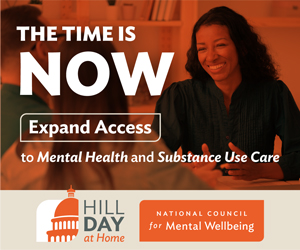Overnight Health Care — Presented by the National Council for Mental Wellbeing — FDA panel endorses booster shots of Johnson & Johnson vaccine

Welcome to Friday’s Overnight Health Care, where we’re following the latest moves on policy and news affecting your health. Subscribe here: digital-release.thehill.com/newsletter-signup.
We hope you’re in a good mood this Friday. And if not, you can celebrate National Grouch Day with Oscar the Grouch instead.
An FDA advisory panel recommended the agency authorize a booster dose of Johnson & Johnson’s vaccine for everyone who received the shot.
For The Hill, we’re Peter Sullivan (psullivan@digital-release.thehill.com), Nathaniel Weixel (nweixel@digital-release.thehill.com) and Justine Coleman (jcoleman@digital-release.thehill.com). Write to us with tips and feedback, and follow us on Twitter: @PeterSullivan4, @NateWeixel and @JustineColeman8.
Let’s get started.
FDA panel recommends booster shot of Johnson & Johnson vaccine

A Food and Drug Administration (FDA) advisory committee voted to recommend authorizing a second dose of Johnson & Johnson’s COVID-19 vaccine.
The agency’s vaccine advisory committee voted unanimously, 19-0, to recommend authorization of a second dose as early as two months after the primary shot for anyone ages 18 and older.
Unlike the authorizations for boosters for the Pfizer-BioNTech and Moderna vaccines, no restrictions were put on the J&J booster. The panel said that the J&J vaccine, like the other vaccines, requires two doses to be effective, though there was some heated debate as to whether the J&J vaccine was actually a two-dose shot, rather than a single dose with a booster.
Johnson & Johnson representatives told the panel that a second dose given either two months or six months after the first shot increased antibody levels, but a single dose of the vaccine continued to offer protection.
Data concerns: Committee members expressed concern with the quality of data presented by the company, because there were ultimately only 17 people included in an analysis, who were followed for six months. But at the same time, many said they felt like additional shots should be made available.
“If the vaccine isn’t adequate, then it should be boosted in everybody,” said Eric Rubin editor-in-chief of The New England Journal of Medicine. “I’m not sure why you’re asking for an indication that would apply to millions of patients with a data set that includes 17 patients,” he said.
Still, the vote and subsequent FDA action will likely add some clarity to the path forward for the 15 million people who received a Johnson & Johnson vaccine.
What’s next: The recommendation will now be taken up by the FDA, which could make a decision within days. A Centers for Disease Control and Prevention panel meets on the issue next week.
A MESSAGE FROM THE NATIONAL COUNCIL
This is our chance to expand access to care. Join us on October 19 for Hill Day at Home – the largest mental health and substance use advocacy event of the year. Learn more.
SUPREME COURT ONCE AGAIN FACING TEXAS ABORTION LAW: DOJ TO ASK COURT TO BLOCK IT
The Justice Department says it plans to ask the Supreme Court to block Texas’s controversial new abortion law hours after a federal appeals court ruled that the statute can remain in effect while it hears the Biden administration’s legal challenge.
“The Justice Department intends to ask the Supreme Court to vacate the Fifth Circuit’s stay of the preliminary injunction against Texas Senate Bill 8,” Anthony Coley, a spokesman for the department, said in an emailed statement Friday.
A three-judge panel for the Fifth Circuit Court of Appeals ruled 2-1 late Thursday night in favor of keeping the law known as S.B. 8 in effect, overruling a trial judge’s injunction that blocked the ban on abortions after six weeks of pregnancy.
The move will once again present the Supreme Court with the question of whether to suspend S.B. 8, which has shut down many of the state’s abortion providers over fears of legal liability.
The high court will hear in December another case over a Mississippi abortion restriction that is directly challenging the landmark 1973 decision in Roe v. Wade, which established a constitutional right to abortions.
The Texas law has been in place since Sept. 1, when the Supreme Court declined to stop it from going into effect in a 5-4 ruling. Five of the high court’s conservative justices voted in favor of the law while Chief Justice John Roberts and the three members of the bench’s liberal wing dissented.
US to allow fully vaccinated international travelers to visit starting Nov. 8

The United States will lift border restrictions for fully vaccinated international travelers beginning Nov. 8, according to the White House.
The policy will be effective for both land borders and air travel.
Restrictions on international travelers have been renewed monthly since the beginning of the pandemic in March 2020, even as other countries have opened up their borders to fully vaccinated Americans.
The administration announced earlier this week that the land borders with Mexico and Canada would be open for fully vaccinated travelers in early November, though they had not set a specific date.
Unvaccinated travelers will still be prohibited from traveling to the United States by land for nonessential reasons until January. Beginning in early January, any foreign national travelers crossing the land borders must be fully vaccinated, whether coming for essential or nonessential reasons.
A similar policy for international air travel was announced last month, when the White House said it would allow fully vaccinated travelers from 33 countries, including China, Brazil and most of Europe.
It’s still unclear which vaccines will qualify. The administration will leave it up to the Centers for Disease Control and Prevention to determine that, though officials have indicated people who’ve received a full dose of vaccines authorized by either the FDA or listed for emergency use by the World Health Organization will meet the criteria.
CDC data: Unvaccinated 11 times more likely to die from COVID-19 than fully vaccinated

Unvaccinated people have an 11 times higher risk of dying from COVID-19 than fully vaccinated people, according to new data posted by the Centers for Disease Control and Prevention.
The data run through August and are from 16 health departments representing about 30 percent of the U.S. population, the CDC said.
In addition, the data show that unvaccinated people have a six times higher chance of testing positive for COVID-19 than fully vaccinated people do.
The data add to a pile of evidence showing the reduced risks from the virus that vaccination brings. About 77 percent of the eligible population, people 12 and older, now has at least one shot of the vaccine, but the Biden administration has been urging the remaining 23 percent to get the shots and has been turning to vaccine requirements as voluntary efforts like incentives hit a ceiling.
Breakdown by type of vaccine: The information comes from a new data page posted by the CDC that also includes a breakdown based on which vaccine people received.
The risks are far higher for unvaccinated people than for people receiving any vaccination, but the data does show somewhat higher levels of cases and deaths in people receiving the Johnson & Johnson vaccine, followed by Pfizer and then Moderna.
As of Aug. 29, there were 665 cases per 100,000 people among the unvaccinated, compared to 150 among Johnson & Johnson recipients, 125 among Pfizer recipients, and 86 among Moderna recipients.
A MESSAGE FROM A MESSAGE FROM THE NATIONAL COUNCIL
This is our chance to expand access to care. Join us on October 19 for Hill Day at Home – the largest mental health and substance use advocacy event of the year. Learn more.
BIDEN ADMIN TO INVEST $100M TO BOOST HEALTH CARE, ATTRACT WORKERS
The Biden administration on Thursday announced that it would be investing $100 million to boost the health care industry by funding state programs aimed at attracting and retaining workers in underserved communities.
The Department of Health and Human Services (HHS) noted that the $100 million, which is being channeled from the American Rescue Plan, would go toward supporting the National Health Service Corps’s State Loan Repayment Program (SLRP).
What it entails: The program provides grants to states to help boost clinicians working in areas that have a recognized health care shortage.
HHS said it would be serving a maximum of 50 grants of up to $1 million each per year over four years, noting it was a fivefold increase to previous funding for the SLRP.
State programs applying for the federal grants will have until April 8, 2022, to file applications, and the grants will be administered that September.
“Our health care workers have worked tirelessly to save lives throughout this pandemic and now it’s our turn to invest in them,” HHS Secretary Xavier Becerra said in a statement.
WHAT WE’RE READING
- Three lessons for the effort to scale up Covid-19 rapid tests (Stat News)
- Cities, police unions clash as vaccine mandates take effect (The Associated Press)
- Here’s what happens next after an F.D.A. panel recommended Moderna and J.&J. boosters. (The New York Times)
STATE BY STATE
- K-12 schools without mask mandates in Michigan saw 62% more coronavirus spread (Detroit Free Press)
- W.Va. House passes vaccine mandate exemption bill (WSAZ)
- Appeals court refuses to stop Mills vaccine mandate (Bangor Daily News)
That’s it for today, thanks for reading. Check out The Hill’s healthcare page for the latest news and coverage. See you Monday.
{mosads}
Copyright 2023 Nexstar Media Inc. All rights reserved. This material may not be published, broadcast, rewritten, or redistributed.


